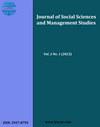商业智能、公司治理和经济绩效:来自Transcorp集团2012 - 2021年的证据
引用次数: 0
摘要
随着企业努力实现及时的数据驱动决策,对商业智能的投资不断飙升。本实证研究希望定量地确定在商业智能方面的巨大投资是否转化为增加的盈利能力;如果它与董事会薪酬和会议等公司治理变量的相互作用导致盈利能力显著提高。本研究以经济理论为依托,利用Transcorp集团2012 - 2021年的二手数据,发现:商业智能投入过多导致盈利能力显著下降;董事会薪酬高和会议次数增加对盈利能力有显著的负面影响;银行规模对盈利能力有显著的正向影响;商业智能与董事会薪酬的交互作用以及商业智能与董事会会议的交互作用对盈利能力有显著的正向影响;商业智能、董事会薪酬和董事会会议的交互作用对盈利能力有显著的负向影响。确立了经济理论与商业智能和治理研究的相关性;并建议公司总体上应该优化本文章由计算机程序翻译,如有差异,请以英文原文为准。
Business Intelligence, Corporate Governance and Economic Performance: Evidence from Transcorp Conglomerate for the period 2012 - 2021
Investment in business intelligence keeps soaring as businesses strive to achieve timely data-driven decisions. This empirical study desired to quantitatively establish if the huge investment in business intelligence translates to increased profitability; and if its interaction with corporate governance variables like board emoluments and meetings lead to significant increase in profitability. Anchoring on economic theory with secondary data from Transcorp Conglomerate from 2012 – 2021, the research established that: excessive investment in business intelligence leads to significant decrease in profitability; high board emoluments and increased number of meetings have significant negative effects on profitability; bank size have significant positive effect on profitability; the interactions of business intelligence and board emoluments as well as the interactions of business intelligence and board meetings have significant positive effects on profitability; and the interaction of business intelligence, board emoluments and board meetings has significant negative effect on profitability. The study established the relevance of economic theory on business intelligence and governance study; and recommends that firms in general should optimise
求助全文
通过发布文献求助,成功后即可免费获取论文全文。
去求助
来源期刊

Journal of Social Sciences and Management Studies
Social Sciences and Management Studies-
自引率
0.00%
发文量
0
期刊介绍:
Journal of Social Sciences and Management Studies (ISSN: 2957-8795) is a peer reviewed journal focuses on integrating theory, research and practice in the area of management and social sciences. The journal discusses the distinctive disciplinary practices within the sciences of the management and social field and examines examples of these practices. In order to define and exemplify disciplinarity, the journal fosters dialogue ranging from the broad and speculative to the microcosmic and empirical. In considering the varied interdisciplinary, trans-disciplinary or multidisciplinary work across and between the social, natural and applied sciences, the journal showcases interdisciplinary practices in action. The focus of papers ranges from the finely grained and empirical, to wide-ranging multi-disciplinary and transdisciplinary practices, to perspectives on knowledge and method.
 求助内容:
求助内容: 应助结果提醒方式:
应助结果提醒方式:


